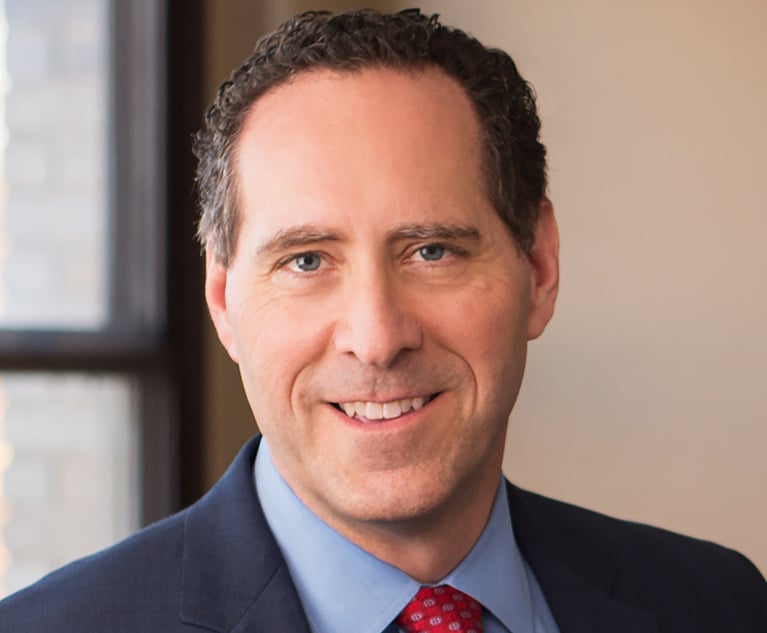Leadership Planning Is Key at Expanding Mid-Atlantic Firm Offit Kurman
"We believe in letting our lawyers practice and our professional managers do the managing. That said, there will always need to be lawyers to participate in practice group management as well as high-level management of a law firm," managing partner Tim Lynch said.
June 07, 2018 at 01:12 PM
6 minute read
 Tim Lynch. in Philadelphia How big is your firm, where is it located and what are its primary areas of practice and focus? 170-plus attorneys and growing. We have 12 offices in four regions: Washington, D.C., metro, Baltimore metro, Philadelphia metro and New York metro regions. Our primary focus is to represent the privately held marketplace, from owner-managed businesses, to entrepreneurs and families of wealth, as well as to act as specialty counsel to institutional clients. Please explain your firm's governance structure and compensation model. Governance: The firm has a governing board with eight shareholders and the firm's COO. The board appoints a five-person management committee that runs the day-to-day operations of the firm. The firm also has principals that manage on a regional and practice group level. Those attorneys report to the managing principal. The firm also has a chief operating officer and a number of nonlawyer firm-level and regional-level managers. Compensation model: Offit Kurman is a professional association. All of the attorneys have a salary and the opportunity to earn objective bonuses based [on] their billable production and their origination. The shareholders share in the profits of the firm as well. What do you view as the biggest opportunities for your firm, and what are the biggest threats? Opportunities: Expanding on a regional basis, leveraging our service platform with an affordable pricing structure. Threats: Competition for lateral movement of attorneys. After the recession hit, the prevailing theory was that midsize firms would start to see more work come their way from large clients who could no longer justify paying Big Law rates. What has been your experience? Offit Kurman experienced growth in its institutional practice areas during the recession, as large clients pushed back on rates and large firms pushed out lawyers who could not meet the large firm metrics. Offit Kurman added a number of our current attorneys during this timeframe. As Offit Kurman has grown a deep full-service platform while maintain its pricing structure, it has become more attractive to large market clients. Are your clients pushing for more alternative fee arrangements, and if so what types? Is your firm amenable to those requests? As business owners, our clients are always looking for the best value they can realize from their legal services that we provide. Offit Kurman is flexible in terms of meeting those client needs when it comes to determining how to price its services. There is much debate around how law firms can foster the next generation of legal talent. What advantages and disadvantages do midsize firms have in attracting and retaining young lawyers, particularly millennials? I can't speak for all midsize firms, but Offit Kurman provides all our attorneys an entrepreneurial path to growing their practice. The younger generation of lawyers want leadership opportunities and training. Offit Kurman provides support to lawyers at every level to help them reach their goals. In that regard, Offit Kurman has developed a multiyear training and support program for all associates as well as many of our junior level principals. The attorneys in these programs meet monthly with outside third-party professionals as well as our own leaders to help them develop as lawyers and leaders. Offit Kurman has had great success in attracting and retaining young talent. Does your firm employ any nonlawyer professionals in high-level positions (e.g. COO, business development officer, chief strategy officer, etc.)? If so, why is it advantageous to have a nonlawyer in that role? A key element of Offit Kurman's growth plan and success is our nonlawyer professional management team. Our COO, Aaron Bukowitz, manages our team of professional managers. We have high-level managers who take the lead on our administrative, marketing, IT, business development, facilities, credit, accounting and finance, and human resource functions. Offit Kurman's nonlawyer management allows our attorneys to focus on growing their business and servicing their clients without the burden of worrying about the administrative side of the business of law. We believe in letting our lawyers practice and our professional managers do the managing. That said, there will always need to be lawyers to participate in practice group management as well as high-level management of a law firm. At Offit Kurman we move as much of the management responsibility to our professional managers. They are an exceptional team. What, if any, technology advancements have you made in your firm in recent years? What are the challenges in implementing tech changes? We stay very current with regard to the implementation of technologies needed to protect our systems as well as our client data. We have also moved most of our applications to the cloud so that every professional can service their client needs from wherever they are, and to assist them in working collaboratively with the lawyers from region to region. Providing that type of access is crucial to improve efficiencies in client services as well as in providing the flexibility that our professionals desire. That said, providing this freedom requires our IT team to remain vigilant in protecting against the ever-growing third-party technology threats. What would you say is the most innovative thing your firm has done recently, whether it be internal operations, how you work with clients, etc.? We have won several awards and industry recognition for innovation from IT training to our creation of the medical cannabis practice group. Our newest innovation is the development of an origination culture program geared toward the structured training of associates and our newer principals to help them grow their practices and to foster the development [of] leadership in those who show potential. Does your firm have a succession plan in place? If so, what challenges do you face in trying to execute that plan? If you don't currently have a plan, is it an issue your firm is thinking about? Management and client succession are very important issues for all firms to address. At Offit Kurman we are very proactive in regards to client succession. Firm management meets with all attorneys who have expressed a desire to retire or begin [to] wind down their practice in the next five years and management works with the attorney to develop a transition plan.
Tim Lynch. in Philadelphia How big is your firm, where is it located and what are its primary areas of practice and focus? 170-plus attorneys and growing. We have 12 offices in four regions: Washington, D.C., metro, Baltimore metro, Philadelphia metro and New York metro regions. Our primary focus is to represent the privately held marketplace, from owner-managed businesses, to entrepreneurs and families of wealth, as well as to act as specialty counsel to institutional clients. Please explain your firm's governance structure and compensation model. Governance: The firm has a governing board with eight shareholders and the firm's COO. The board appoints a five-person management committee that runs the day-to-day operations of the firm. The firm also has principals that manage on a regional and practice group level. Those attorneys report to the managing principal. The firm also has a chief operating officer and a number of nonlawyer firm-level and regional-level managers. Compensation model: Offit Kurman is a professional association. All of the attorneys have a salary and the opportunity to earn objective bonuses based [on] their billable production and their origination. The shareholders share in the profits of the firm as well. What do you view as the biggest opportunities for your firm, and what are the biggest threats? Opportunities: Expanding on a regional basis, leveraging our service platform with an affordable pricing structure. Threats: Competition for lateral movement of attorneys. After the recession hit, the prevailing theory was that midsize firms would start to see more work come their way from large clients who could no longer justify paying Big Law rates. What has been your experience? Offit Kurman experienced growth in its institutional practice areas during the recession, as large clients pushed back on rates and large firms pushed out lawyers who could not meet the large firm metrics. Offit Kurman added a number of our current attorneys during this timeframe. As Offit Kurman has grown a deep full-service platform while maintain its pricing structure, it has become more attractive to large market clients. Are your clients pushing for more alternative fee arrangements, and if so what types? Is your firm amenable to those requests? As business owners, our clients are always looking for the best value they can realize from their legal services that we provide. Offit Kurman is flexible in terms of meeting those client needs when it comes to determining how to price its services. There is much debate around how law firms can foster the next generation of legal talent. What advantages and disadvantages do midsize firms have in attracting and retaining young lawyers, particularly millennials? I can't speak for all midsize firms, but Offit Kurman provides all our attorneys an entrepreneurial path to growing their practice. The younger generation of lawyers want leadership opportunities and training. Offit Kurman provides support to lawyers at every level to help them reach their goals. In that regard, Offit Kurman has developed a multiyear training and support program for all associates as well as many of our junior level principals. The attorneys in these programs meet monthly with outside third-party professionals as well as our own leaders to help them develop as lawyers and leaders. Offit Kurman has had great success in attracting and retaining young talent. Does your firm employ any nonlawyer professionals in high-level positions (e.g. COO, business development officer, chief strategy officer, etc.)? If so, why is it advantageous to have a nonlawyer in that role? A key element of Offit Kurman's growth plan and success is our nonlawyer professional management team. Our COO, Aaron Bukowitz, manages our team of professional managers. We have high-level managers who take the lead on our administrative, marketing, IT, business development, facilities, credit, accounting and finance, and human resource functions. Offit Kurman's nonlawyer management allows our attorneys to focus on growing their business and servicing their clients without the burden of worrying about the administrative side of the business of law. We believe in letting our lawyers practice and our professional managers do the managing. That said, there will always need to be lawyers to participate in practice group management as well as high-level management of a law firm. At Offit Kurman we move as much of the management responsibility to our professional managers. They are an exceptional team. What, if any, technology advancements have you made in your firm in recent years? What are the challenges in implementing tech changes? We stay very current with regard to the implementation of technologies needed to protect our systems as well as our client data. We have also moved most of our applications to the cloud so that every professional can service their client needs from wherever they are, and to assist them in working collaboratively with the lawyers from region to region. Providing that type of access is crucial to improve efficiencies in client services as well as in providing the flexibility that our professionals desire. That said, providing this freedom requires our IT team to remain vigilant in protecting against the ever-growing third-party technology threats. What would you say is the most innovative thing your firm has done recently, whether it be internal operations, how you work with clients, etc.? We have won several awards and industry recognition for innovation from IT training to our creation of the medical cannabis practice group. Our newest innovation is the development of an origination culture program geared toward the structured training of associates and our newer principals to help them grow their practices and to foster the development [of] leadership in those who show potential. Does your firm have a succession plan in place? If so, what challenges do you face in trying to execute that plan? If you don't currently have a plan, is it an issue your firm is thinking about? Management and client succession are very important issues for all firms to address. At Offit Kurman we are very proactive in regards to client succession. Firm management meets with all attorneys who have expressed a desire to retire or begin [to] wind down their practice in the next five years and management works with the attorney to develop a transition plan.This content has been archived. It is available through our partners, LexisNexis® and Bloomberg Law.
To view this content, please continue to their sites.
Not a Lexis Subscriber?
Subscribe Now
Not a Bloomberg Law Subscriber?
Subscribe Now
NOT FOR REPRINT
© 2025 ALM Global, LLC, All Rights Reserved. Request academic re-use from www.copyright.com. All other uses, submit a request to [email protected]. For more information visit Asset & Logo Licensing.
You Might Like
View All
Cozen O'Connor's Bernard Nash Pioneered the Modern State AGs Practice. Now He's Hanging Up His Boots
6 minute read
Cohen Seglias Leader Discusses Growing From Construction Practice into Full-Service Law Firm


Trending Stories
Who Got The Work
J. Brugh Lower of Gibbons has entered an appearance for industrial equipment supplier Devco Corporation in a pending trademark infringement lawsuit. The suit, accusing the defendant of selling knock-off Graco products, was filed Dec. 18 in New Jersey District Court by Rivkin Radler on behalf of Graco Inc. and Graco Minnesota. The case, assigned to U.S. District Judge Zahid N. Quraishi, is 3:24-cv-11294, Graco Inc. et al v. Devco Corporation.
Who Got The Work
Rebecca Maller-Stein and Kent A. Yalowitz of Arnold & Porter Kaye Scholer have entered their appearances for Hanaco Venture Capital and its executives, Lior Prosor and David Frankel, in a pending securities lawsuit. The action, filed on Dec. 24 in New York Southern District Court by Zell, Aron & Co. on behalf of Goldeneye Advisors, accuses the defendants of negligently and fraudulently managing the plaintiff's $1 million investment. The case, assigned to U.S. District Judge Vernon S. Broderick, is 1:24-cv-09918, Goldeneye Advisors, LLC v. Hanaco Venture Capital, Ltd. et al.
Who Got The Work
Attorneys from A&O Shearman has stepped in as defense counsel for Toronto-Dominion Bank and other defendants in a pending securities class action. The suit, filed Dec. 11 in New York Southern District Court by Bleichmar Fonti & Auld, accuses the defendants of concealing the bank's 'pervasive' deficiencies in regards to its compliance with the Bank Secrecy Act and the quality of its anti-money laundering controls. The case, assigned to U.S. District Judge Arun Subramanian, is 1:24-cv-09445, Gonzalez v. The Toronto-Dominion Bank et al.
Who Got The Work
Crown Castle International, a Pennsylvania company providing shared communications infrastructure, has turned to Luke D. Wolf of Gordon Rees Scully Mansukhani to fend off a pending breach-of-contract lawsuit. The court action, filed Nov. 25 in Michigan Eastern District Court by Hooper Hathaway PC on behalf of The Town Residences LLC, accuses Crown Castle of failing to transfer approximately $30,000 in utility payments from T-Mobile in breach of a roof-top lease and assignment agreement. The case, assigned to U.S. District Judge Susan K. Declercq, is 2:24-cv-13131, The Town Residences LLC v. T-Mobile US, Inc. et al.
Who Got The Work
Wilfred P. Coronato and Daniel M. Schwartz of McCarter & English have stepped in as defense counsel to Electrolux Home Products Inc. in a pending product liability lawsuit. The court action, filed Nov. 26 in New York Eastern District Court by Poulos Lopiccolo PC and Nagel Rice LLP on behalf of David Stern, alleges that the defendant's refrigerators’ drawers and shelving repeatedly break and fall apart within months after purchase. The case, assigned to U.S. District Judge Joan M. Azrack, is 2:24-cv-08204, Stern v. Electrolux Home Products, Inc.
Featured Firms
Law Offices of Gary Martin Hays & Associates, P.C.
(470) 294-1674
Law Offices of Mark E. Salomone
(857) 444-6468
Smith & Hassler
(713) 739-1250





